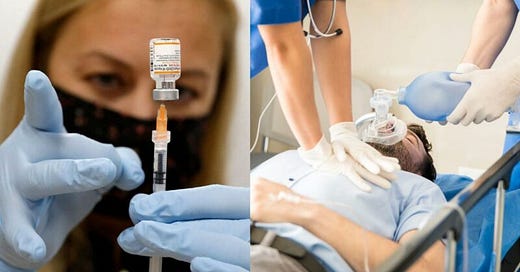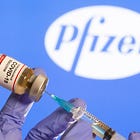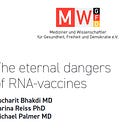Unsealed Government Data: Hospitals Saw Surge in Heart Issues after Covid ‘Vaccine’ Rollout
Unsealed official government data has revealed that the number of people being hospitalized with heart issues surged after Covid mRNA “vaccines” were rolled out for public use.
By Frank Bergman October 13, 2024
Unsealed official government data has revealed that the number of people being hospitalized with heart issues surged after Covid mRNA “vaccines” were rolled out for public use.
New Zealand’s government was forced to release the information after being hit with an Official Information Act (OIA) request.
An OIA is New Zealand’s equivalent of a Freedom of Information Act (FOIA) request.
The unsealed data shows hospital admissions for chest pain and cardiac incidences in younger people have skyrocketed.
The spike is so severe that experts who were already raising concerns about the Covid shots are stunned by the “scale of the disaster” after reviewing the OIA data.
Dr. Guy Hatchard, the senior researcher at Maharishi International University in Iowa, is among those raising the alarm over the unsealed statistics.
“Making sense of the scale of the disaster is hard,” Dr. Hatchard says.
But “the OIA data for chest pain and cardiac events is not an isolated statistic.”
Health New Zealand conducted a follow-up survey of the nation’s citizens who had been diagnosed with mRNA vaccine-induced myopericarditis – heart inflammation.
After delaying the release of the survey results for two years, the government agency was forced to finally publish the information.
The lack of information has had the effect of myopericarditis being greatly underdiagnosed or a diagnosis and clinical response delayed, even in some cases for years.
However, this information deficit continues to this day.
“Well over 30,000 people [ ] will report to Accident and Emergency with chest pains this year, compared to just 2,000 pre-pandemic,” Hatchard notes.
The extraordinary New Zealand data reveals that chest pain and cardiac incidence among the under-forties have increased tenfold.
Yet, the issue shows no signs of slowing down and continues to remain high.
As Hatchard notes, the OIA data for chest pain and cardiac events is not an isolated statistic.
Medsafe recently released the results of a follow-up survey of 298 New Zealand patients.
Those patients received a clinical diagnosis of mRNA vaccine-induced myopericarditis at least 90 days prior to filling in the survey.
This survey was conducted two years ago.
Inexplicably, Medsafe has been battling to keep the results of the survey hidden from the public.
However, the agency was forced to publish the data late last month.
Contrary to earlier advice given to people experiencing symptoms of myocarditis that the final outcome would be mild and self-limiting, the survey revealed persistent serious problems beyond 90 days that had not been resolved.
The survey of adolescents and adults found:
The median age was 36.5 years.
62% were male…. Chest pain was the most frequently reported physical symptom, experienced by 287 (96.3%) participants, followed by fatigue (256; 85.9%), shortness of breath (251; 84.2%), palpitations (234; 78.5%), and dizziness (189; 63.4%).
Twenty-two (7.4%) participants reported fainting.
Representative survey responses to a range of open-ended questions about work, family life, treatment, follow-up, etc included the following:
“Tried to exercise again and pericarditis symptoms returned.”
“Chest pain is extreme … not being able to walk without a cane.”
“This experience has caused anxiety and depression.”
“Before I was diagnosed, I was a full-time worker and into [sporting activity], since I got it, I can’t work at all or do any exercise.”
“Not being able to take care of my children is just awful. I can’t even kick a ball with my sons anymore.”
“I was initially told a number of times in ED [emergency department] that I was having anxiety attacks. I felt like no one was listening to me which made it even harder.”
“Was anxious about having the booster and I was fobbed off. I am not an ‘anti-vaxxer’. Doctors need to listen and be more empathetic.”
“Disappointed with lack of aftercare. Absolutely no specialist follow-up. Very disappointing.”
“Utter frustration that I had to go privately to get any help. Was told it would take one year to get any cardiac test. I would still be waiting for a diagnosis. I had to go privately.”
“To hear … myopericarditis repeatedly being reported as a mild consequence of vaccination was a huge insult and should immediately stop. This is not a mild sequela for many. This is a profound life-changing and devastating event.”
“ACC – although accepting my vaccine injury treatment injury claim – decided seven days was sufficient time to recover [from it] … it took … nearly 8 months after the claim, for full cover to be approved.”
The “Key Learnings” section of the report admits there were deficiencies in:
The vaccine information given to the public.
Reporting systems for adverse reactions.
Knowledge about possible adverse reactions.
Keeping up to date with the implications of clinical publishing.
The net effect was to create a deficient clinical and informational response to the tens of thousands of people reporting to GPs and emergency departments with chest pain.
As a result, myopericarditis has been greatly underdiagnosed or a diagnosis and clinical response have been delayed, even in some cases for years.
Source: slaynews.com
Related articles:












This was the plan all along, as I keep pointing out. When it becomes popular to say it, someone important will take credit for "revealing" it.
They can't hide it forever. Word is getting around everywhere. It's why they want to "modify" the First Amendment.